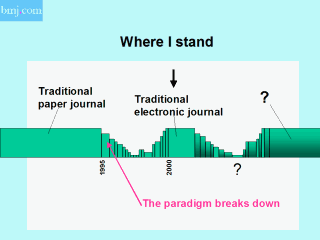| front |1 |2 |3 |4 |5 |6 |7 |8 |9 |10 |11 |12 |13 |14 |15 |16 |17 |18 |19 |20 |21 |22 |23 |24 |25 |26 |27 |28 |29 |30 |31 |32 |33 |review |
 |
So how does the
notion of "paradigms" help us here? It's clear there's been a fairly consistent paradigm for scientific publishing since 1665, and its been the paper journal. From 1995 to 2000, something new arrived -the electronic journal. For those of us closely involved in the process - John Sack, Bill Wistcher, Kent Anderson - it's been an exciting and messy and sometimes exhausting time, and what we've ended up with is a new paradigm, that we can call slightly "the traditional online journal." So I want to situate myself here - on reasonably firm ground. Most of my talk will be concerned with looking back -how did we get from there to here. But I really want to turn around and look ahead too. Between these two we'll cover all the bmj.com’s new initiatives – realised and planned - the advertised title of this talk. Some caveats: My position is accurately described as editor, bmj.com. The BMJ Publishing Group has websites for another 30 odd specialist journals, books, and other more exotic confections. I don't run those divisions; in some cases they have radically different notions from mine. Lack of consensus is not a problem – one of the 4 aims of our group strategy is to Embrace experimentation." BMJ centric What you're getting is the view from a general medical journal, not a specialist journal. (JAMA ---NEJM, Lancet) Alllowed to travel around. Realisation that one size does not fit all. |